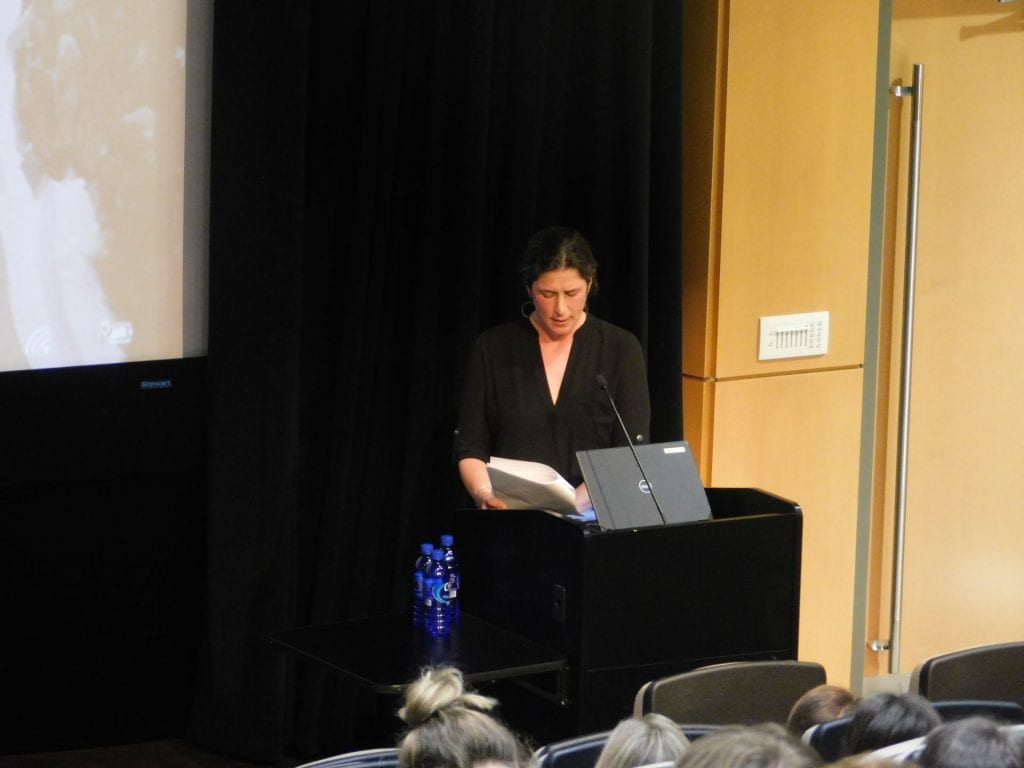
On Tuesday, March 10th the Institute for Human Rights alongside the UAB Department of English and the UAB Department of Political Science and Public Administration welcomed Rebecca Traister, writer-at-large for New York magazine, to present a lecture entitled, “Good and Mad: The Political Consequences of Women’s Anger.” The lecture is a part of the UAB Department of English Alumni Lecture series, a series that invites prominent writers and scholars twice a year to discuss ideas and issues related to the study of English. In this lecture, Traister discussed her inspiration for writing and how she became a writer, women’s anger throughout history, the validity of women’s anger, and how women’s anger can make change in the modern era.
The lecture focused on the consequences of women’s anger, a topic that Traister has extensively written about in her book “Good and Mad: The Revolutionary Power of Women’s Anger,” published in 2018. Traister has also written books entitled “All the Single Ladies: Unmarried Women and the Rise of an Independent Nation,” published in 2016, and “Big Girls Don’t Cry,” published in 2010, that focus on similar topics. Alongside her books, Traister has been a feminist journalist for 15 years and describes anger to be a significant part of her work. This anger, Traister says, is a reaction to the many inequalities and injustices in the world. Without anger, it would be impossible to be in the line of work she is in. However, Traister describes being unable to be openly angry. She found that expressing her personal rage would undermine the messages she has been so committed to sharing.

This changed in 2016 with the election that ultimately resulted in Donald Trump becoming the President of the United States. Traister had covered the Hillary Clinton campaign as a journalist and describes being unsurprised that Clinton had lost but at the same time “shocked to the point of paralysis” that Trump won. She also describes feeling a sense of responsibility for being a part of the demographic that voted for Donald Trump (white, middle aged women) and expresses being unable to think clearly because of her anger. Her husband encouraged her to actively pursue her anger and write about it. In a way, this encouragement permitted her to think about anger very intentionally, prompting her to write her 2018 book.
Traister moved from her personal journey to discuss the historical implications of women’s anger and how history classes often remove this narrative. Traister encouraged the audience to think about what we learned about Rosa Parks from grade school: a stoic, exhausted seamstress who practiced an act of quiet resistance. Traister expands on this well-established narrative of Rosa Parks by reminding the audience of Parks’ other accomplishments as a member of the NAACP and encouraging us to remember Rosa Parks as a woman who participated in conscience political action based in fury. In another example, Abigail Adams is known for saying, “remember the ladies,” in a letter she wrote to her husband John Adams. Traister reminds the audience that in the same letter Adams wrote, “All men would be tyrants if they could” and warned her husband that if the founding fathers did not take women into consideration, “women are determined to ferment a rebellion.” Traister also includes Elizabeth Freeman, or Mum Bett, into the example, a slave who sued for her freedom and was successful, concluding in a landmark case that was influential in the emancipation of slaves in Massachusetts. Not many people in the audience had heard Elizabeth Freeman’s name before. It is relatively common to find furious women at the start of many movements in this country, Traister says. The deliberate depiction of women as quiet and merely supplemental or in the right place at the right time removes the purposeful, furious action that women have partaken in throughout history.

Now why has this become the case? Traister argues that this pattern has occurred because angry women are powerful and powerful women are a danger to the patriarchal society. She proceeds to analyze the many ways that angry women have been portrayed in media and history. The stereotype of angry women is that they are infantile and not worthy of listening to. There are examples of describing high profile, powerful, and angry women as shrill, unhinged, ugly, unnatural and “a crazy aunt.” Traister explains that women’s anger is coded in our minds as unattractive, the opposite of how society perceives an angry white man. The best way to discredit women, Traister states, is to simply show them opening their mouths. However, Traister describes some of anger’s most important roles. It can bring people together by creating a movement around a shared fury. It can encourage people to become involved in politics, inciting political change. Black Lives Matter, Mom’s Demand Action, Black Lives Matter, Brett Kavanaugh protests, Time’s Up, #metoo, and many others were all started by women.
At the end of her lecture, Traister encourages us to think about anger differently, as fuel propelling us forward. She states that a movement is made up of many moments and the movement for full equality has been ongoing for two centuries. Each person must decide whether or not to change the world and should we decide to do so, our anger is what is going to keep us fighting. Traister ends the lecture by giving each audience member the same task: keep going, do not turn back, and stay angry for a long time.

